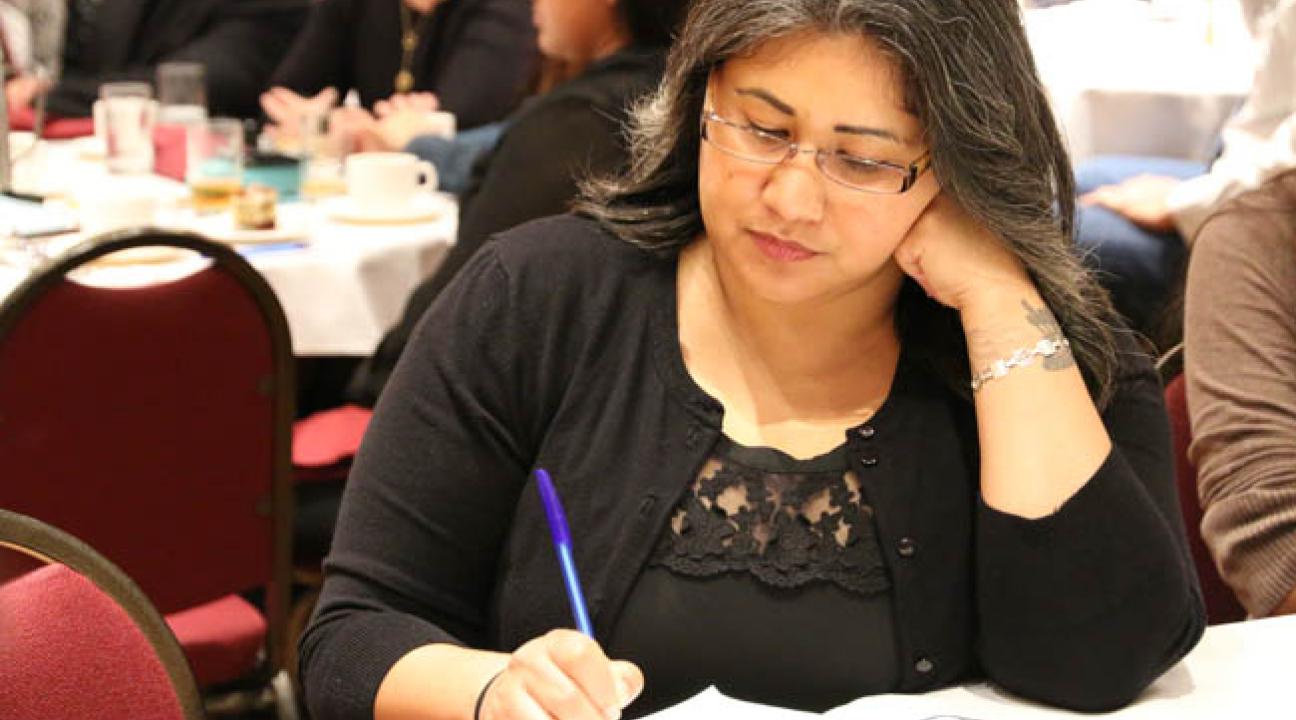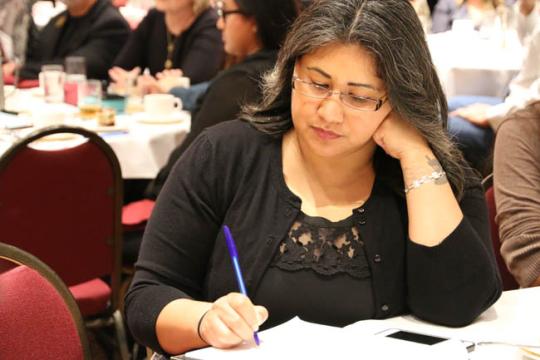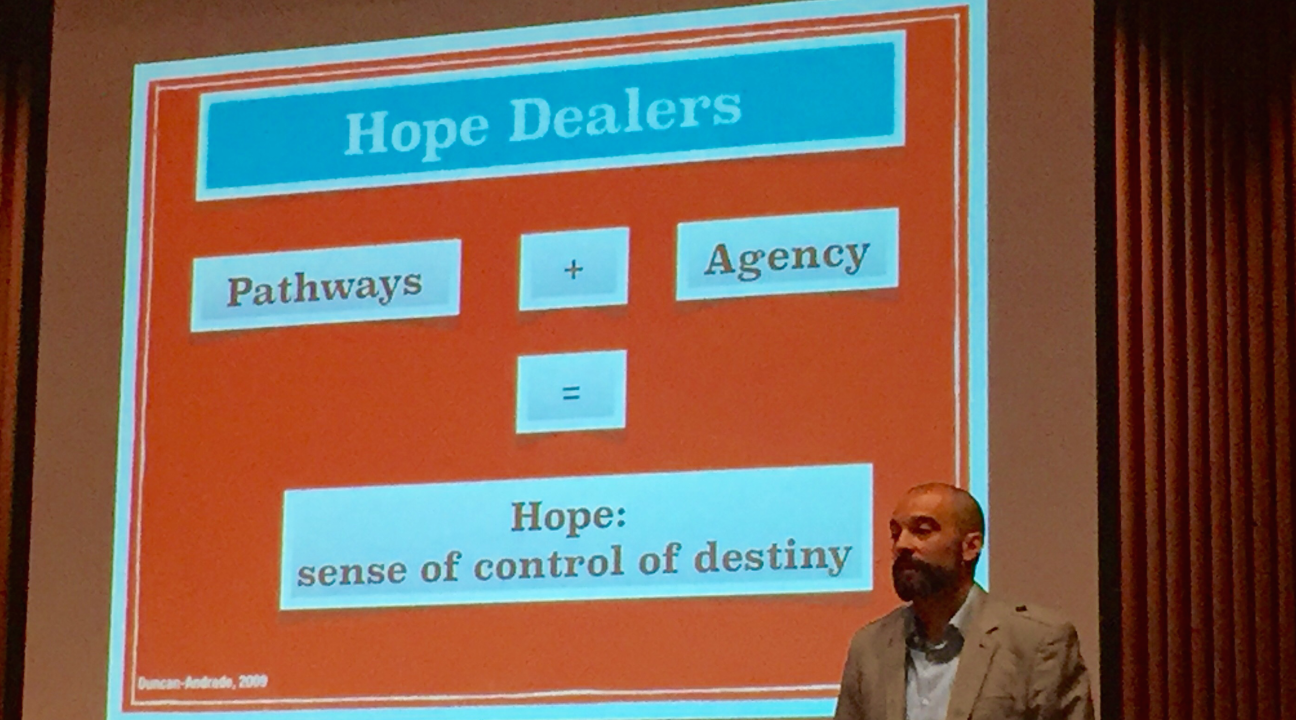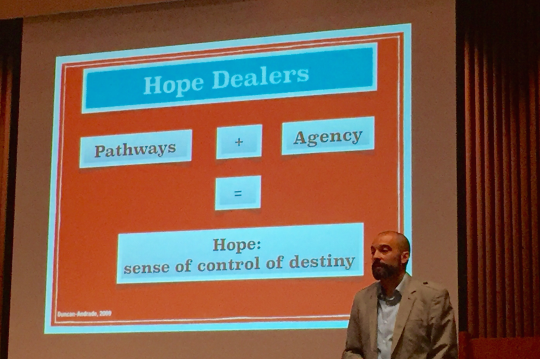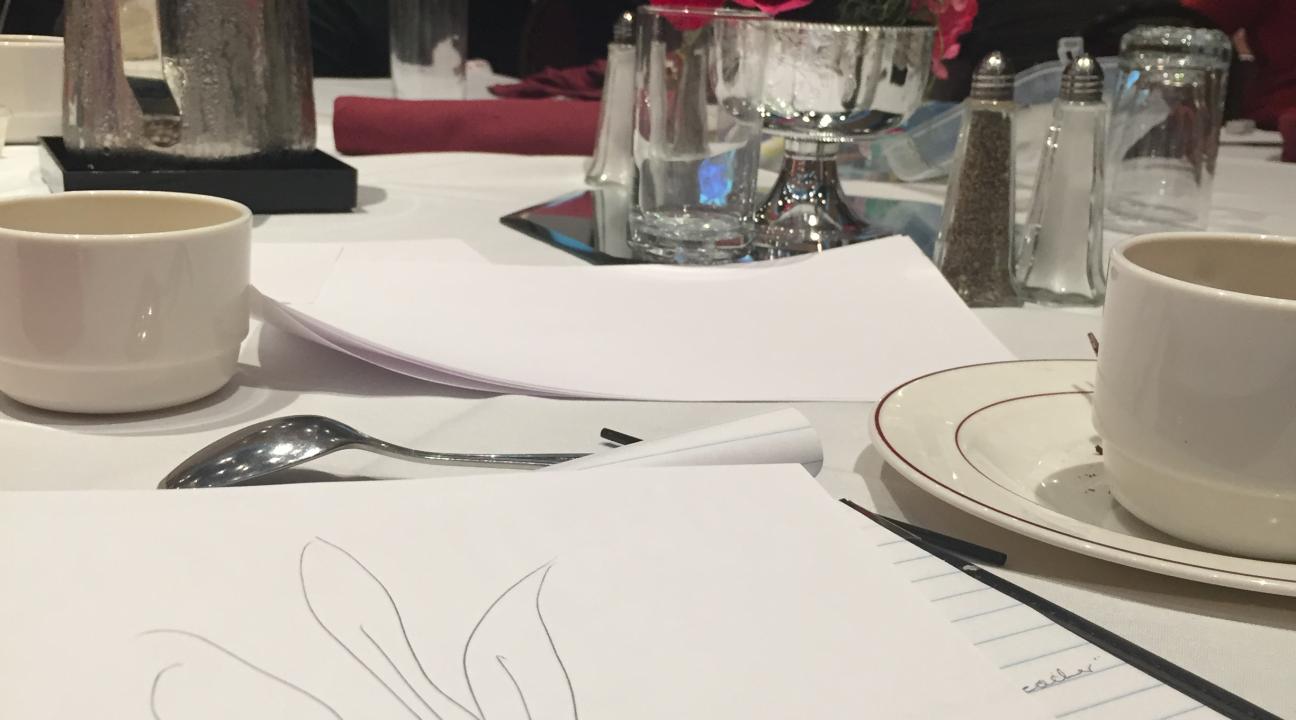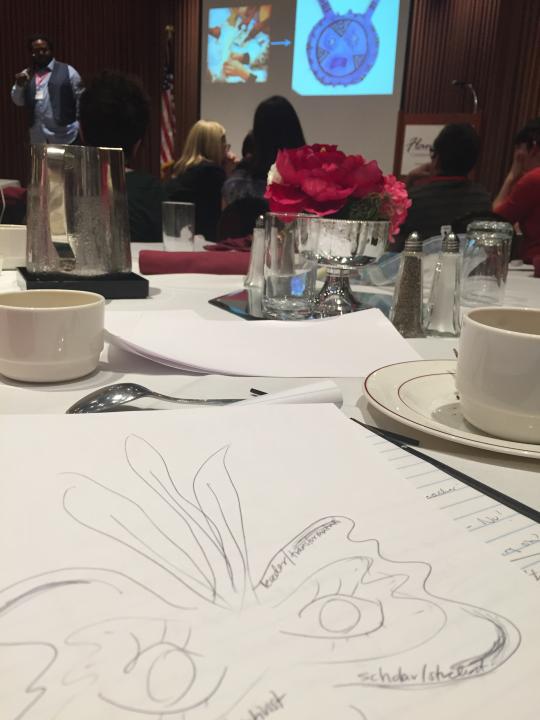Becoming a Hope Dealer for Our Babies
I am an immigrant, English language learner, working class, poor, from a single parent household woman of color. I am someone that was not meant to get ahead because of the at-risk environment I was living under, yet I succeeded. I am pages away from finishing my dissertation, becoming the first in my family to earn not just a PhD, but a master's degree, a college degree and a high school diploma. However, this success was because of two things, my mother that even at our worst made time for me and believed in me (still does), and because I had a principal that loved and believed in me as if I were his own child. That I cannot forget about. Even when I teach in my classes, I always choke up talking about him, he changed my life. And so did the other handful of people that saw me as their baby, as their child, saw me with their heart. You will be surprised how powerful an educator can be if they saw all their students as their own babies.
For two days I was immersed at a conference on and about equity, the Sonoma County Office of Education Equity at the CORE conference held in Santa Rosa. The conference attracted teachers and educators from throughout the county from elementary school level up to institutions of higher education like Sonoma State. I was shocked by the $300 ticket price and was critical about who this conference would attract - school districts that could afford it and that were more likely from middle class backgrounds and from the other side of the freeway. While this was partially true, the conference organizers also worked with individuals and institutions to be able to still have them at the table. As such, a big surprise, for me at least, was that they had invited local Latino parents to come on the second day to be part of the workshop, "Nuestros Hijos: Amor, Animo y Apoyo" (Our Children: Love, Support, and Encouragement) led by Dr. Francisco Reveles.
Dr. Jeff Duncan-Andrade's talk on "Fools, Foes, and Freedom: Which one will you feed?" informed us that the issue of equity is a national issue being discussed in DC as well. The conversations are around taking successful practices back to the communities that those in attendance serve.
Here in the CSU, equity must be at the core of policies made by the trustees, those in leadership and decision making, in the instruction and curriculum, and at the core of student learning and achievement. We have to invest at all levels to have equity, but we must start with the leadership on our campuses. The cost for us not to do so is the health, literally, of individuals and the community.
That was key for me, because I do not think that I realized that many illnesses of our society begin in the schools. Dr. Duncan-Andrade took it way back in the sense that he strongly suggested we must look at the history of this country and its contradictions. We must discuss what this country has done to people of color or those that are on the margins; represent them, highlight them and work from there. In order to be sincere about our efforts, we must begin this conversation(s) at home, we must acknowledge our privileges, biases and the meaning of equity at home - that is essentially the core of what is us. It also means that for many of us, we have to challenge ourselves to see the children/students that we work with on a daily basis as our own children or "babies", the term that Dr. Duncan-Andrade uses. We must work toward eradicating the causes of the damage instead of finding ways to address the symptoms. We must cut off the source that claims our babies, that takes away their sense of belonging.
Dr. Reveles is an amazing speaker, researcher and educator. I met him a while back as a student at Sonoma State while working with Migrant Education. Dr. Reveles' work is around resiliency in youth focusing on re-defining the concept of "at-risk" youth, he has and continues to do work both in the classroom and in juvenile detention centers. He comes at his work with as we say "his heart on his sleeve." Instead of looking at youth or children as troublemakers, not behaving "properly," he looks at their cultural and familial assets that often times are dismissed or overlooked by the majority group. He really emphasizes that we need to look at our students with love, with our hearts, corazón!
As an educator myself, I know he is not at all off on these statements. I am sure that other educators in the room felt the same way, however there were a few who asked the question of how to do that or how we get the student at schools in the first place.
Dr. Releves was really helpful with laying out of the land, what and who are we working with in this community - Sonoma County. So the conference began with key points from the Portrait of Sonoma County report that came out in 2014. The report "is an in-depth look at how the residents of Sonoma County are faring in three fundamental areas: life expectancy, education, and income. The report examines disparities within Sonoma County among neighborhoods and along the lines of race, ethnicity, and gender, and helps identify specific geographic places and populations in the County where we have the potential to positively affect long-term health outcomes."
In a nutshell, the disparities in access and to resources is frighteningly big in all areas - education, income and health. It is so drastic that individuals that live in areas, like where I live, Roseland Creek or Southwest Santa Rosa, can expect to live 10 years less than those in the Bennett Valley area. We will also make about $20,000 less a year because there are less opportunities for people in management or high ranking positions. There is less access to healthy food, affordable housing or housing with space to move around, space, jobs that pay well or above minimum wage, and are less likely to have high levels of educational attainment. What is important to note is that this area is predominately Latino and African American. Therefore, these reports show that we are not in the same playing field; not everyone is starting in the same place. In other words, we are trying to catch up.
As an educator with research emphasis on Latinos and education, I read the report when it first came out, from beginning to end. This report matters: how can you work in a community that you know nothing about? We must know where our students are coming from to know how we will move forward.
What does that mean or what does that look like? It is not necessarily an easy answer but we must first begin with ourselves and at home. We must know of our unconscious biases and how that impacts our babies. He pushed for us to become Hope Dealers; to learn who our babies are and what they already bring with them and work from there. We must acknowledge that these babies do not come as empty cups/glasses into our classrooms/schools -- how could that be? Do they not speak, walk, or think before they come to us? So what are we doing to them?
My friend and mentor, Bobby Verdugo, a participant and leader of the 1968 East Los Angeles Walkouts, once shared in my class that he was a bright little child, he had Kindergarten down, and even in 10th and 11th grade he was doing well, but something happened his senior year. It was as if life was taken from him, he was told repeatedly that he was dumb, that he was wasting his time, that working in manual labor was a good and stable job for his people, that is what his father did after all. He dropped out weeks before graduation. He had less than a 1.0 GPA. He was fighting for an equitable education and did not finish himself. He was fortunate to have people that even after dropping out, believed in him and his potential that he ended up going to UCLA that fall and eventually graduating from CSU Los Angeles. He is a beautiful human being, however somewhere along the "pipeline" someone took his curiosity and love for learning, someone stripped him of his humanity - race, ethnicity, gender, language, social class, and history. Dr. Duncan-Andrade would refer to this as the "Dope." Dope is the stripping away of the babies' humanity to a point that they are not afraid or give a second thought to shooting someone that looks exactly like them, and thus what will we be, the Dope Dealer or a Hope Dealer?
Ashanti Branch, founder of The Ever Forward Club, prompted us to think about another issue we face in schools and in the community and that is of gender expectations and masculinity. He is an African American male who was making good money with his Engineering degree when he decided to volunteer and teach math to predominately Latino and African American students. He then realized that this was not just something he could do in his spare time, but instead it was something he had to do as part of his life. This was his calling and he had to follow it. Interestingly enough, it went beyond teaching math. It was about connecting with the students, the male youth in particular. He explained that math was less the problem than the messages these young men were receiving about gender expectations, manhood and masculinity. These messages were interrupting other parts of their lives, including learning. What we as educators call a misbehaved child may be the result of built up mixed emotions that may have been passed down for generations. Often, it is expected that young men, especially young men of color, will not share or discuss their problems.
I recently read a few articles on the treatments of young men that misbehave in class and it was not a positive experience. In particular, for young men of color, they are more likely to be referred to police or be at schools with high levels of police presence while white young men are referred to counseling or other forms of social services.[1] It was unfortunate that Ashanti did not discuss how this outcome is preventable, since the teachers and administrators are the ones that have ultimate power in providing students with the necessary resources to succeed. This also goes back to Dr. Duncan-Andrade's point of seeing all students as individual human beings.
Ashanti, did however guide us in a conversation about the possible "masks" we wore; our public and private personas. This was an activity to have us reflect on how the youth we work with may also be wearing a mask. What we show on the outside is not always the person we are on the inside. We don't always show the fears and/or issues we might be dealing with. We then watched some clips from the documentary The Mask You Live In. It highlights his program The Ever Forward Club and how he is working with young men of color to help them be healthy adult males.
Dr. Reveles also spoke to a group of Latino parents in Spanish. I think more than anything, he reassured them that what they were doing meant that they were guiding their children in the right direction. He also wanted to make sure parents knew that there is evidence based in research that the ways they are parenting is valuable. I agree with him that we must acknowledge that what they bring to the lives of their children is valuable and important so that they can lead a productive life. By attending the conference, they are showing their children that they care about their education and that they are willing and open to learn for them. Again, learning and teaching from the heart to see their children succeed is of utmost importance.
I left this conference with mixed feelings. I was concerned with the next steps, not just for me, but for those in attendance. What will the teachers and administrators take back with them to their schools/districts? Dr. Duncan-Andrade made it clear that it takes the leadership of the school and/or district to want to create the changes necessary to gain equity. Yet, we must first look at ourselves, at our own biases before we can move forward. Ask ourselves, are we equitable in our own homes? How honest are we about the atrocities that have taken place in this country for the advancement of certain groups? What has been the legacy of slavery been? What about state sponsored segregation? We must be honest about that reality and we cannot think about progress when we have not even acknowledged what we did less than 100 years ago; historical amnesia is not acceptable. This is very important as our children are still being impacted by this legacy; they carry these traumas with them. Let us not forget that these are not just children, but they are our babies and we must nurture them and love them so that they can grow up healthy regardless of their environment; our goal should be to become Hope Dealers.
1. Transforming the Educational Experience of Young Men of Color (2012): https://secure-media.collegeboard.org/digitalServices/pdf/nosca/12b_5136_NOSCAJournal_120330.pdf
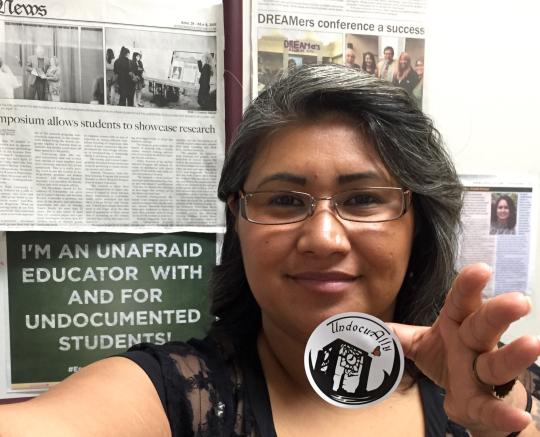
Author: Mariana Garcia Martinez


